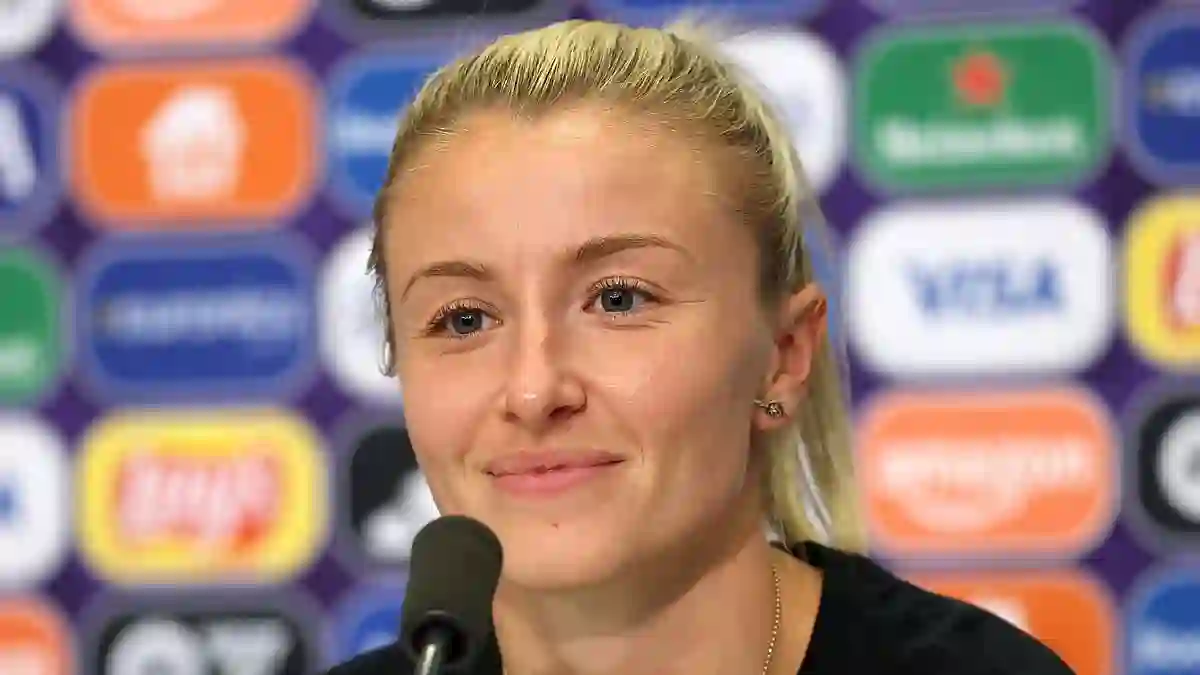When you’re on the brink of your fifth consecutive tournament final, the pressure is enormous.
But Sarina Wiegman—England’s head coach and one of the most respected figures in world football—walked into her latest press session with a smile and a cheeky remark.
Spotting a journalist in flip-flops, she joked, “Have you come in from the beach?” It wasn’t shade—just a glimpse of the warmth that’s quietly emerged over her four years leading the Lionesses.
It’s a small moment, but it speaks volumes about the shift in Wiegman’s personality.
The famously private and focused coach has, over time, allowed a softer side to shine through—even if only a little.
A Private Leader with a Playful Streak
That hidden sense of fun surprised even her players after England’s dramatic victory over Italy earlier in the tournament.
In an uncharacteristic burst of joy, Wiegman belted out a Dutch song—“We Gaan Nog Niet Naar Huis” (“We’re Not Going Home Yet”)—on the pitch, earning a celebratory spray from her squad.
But let’s be clear: despite the occasional moment of levity, Wiegman is still very much a reluctant public figure.
Earlier in the tournament, she was asked about fans chanting her name to the tune of “Tequila”.
Her response? “It doesn’t make me feel comfortable… but they were creative, so I clapped a little.”
She still finds personal attention awkward and would rather the spotlight stay on her team.
Guarded with the Media, Fiercely Loyal to Her Squad
Even when sitting in a relaxed media circle, Wiegman still doesn’t fully let her guard down.
She politely notes how bright the photographer’s light is, and subtly acknowledges her discomfort with media interactions.
“I know that sometimes it’s a bit hard, the discussion you have,” she says, hinting at a lifelong wariness of the press.
She prefers to keep things close, and it’s her inner circle—players and FA staff—who know the real Sarina: caring, empathetic, but also brutally honest.
She’s described as having a maternal instinct.
On Friday, she confessed that when people say “the girls,” she sometimes thinks they’re referring to her daughters—not her players.
That deep connection is real, but so is her Dutch directness and occasional ruthlessness.
Respect Comes with a Hint of Fear
Wiegman’s approach may be nurturing in some ways, but it’s never soft.
Like legendary coaches before her—Louis van Gaal, for example—she keeps her players slightly on edge.
That balance between care and control, affection and authority, is what makes her leadership so effective.
And she’s never afraid to stand her ground.
One women’s football executive recalled a tense situation where Wiegman simply refused to budge.
“She wasn’t willing to budge,” they admitted.
That kind of resolve might rub some the wrong way—but it’s also the stuff elite managers are made of.
Questions Begin to Emerge About the Future
If Wiegman leads England to victory again, she could go down as the most successful football manager in the country’s history.
An honorary damehood might even be in the cards.
But even with success in sight, concerns about the squad’s future are beginning to build.
The lineup hasn’t changed much since England’s 2022 European title run.
Standout talents like Lucy Bronze, Chloe Kelly, and 19-year-old rising star Michelle Agyemang have shone—but many faces are familiar.
It’s sparked an uncomfortable question: Where is the next generation?
Predictability and Missed Youth Opportunities
Some Dutch analysts have seen this story before.
During Wiegman’s time coaching the Netherlands, she rarely rotated her starting XI, which made the team increasingly predictable.
Dutch analyst Amber van Lieshout summed it up: “With Sarina, the same players always played… The young talents stayed on the bench.”
The result? Promising players lacked real match experience, and the team’s edge dulled over time.
Critics worry the same pattern may now be emerging with England.
Will the FA’s Investment Pay Off by 2027?
The FA has poured money into developing grassroots girls’ football, but real results at the elite level may take time.
That delay means Wiegman’s final tournament under her current contract—the 2027 World Cup in Brazil—could be a real test.
It’s also worth noting that the most recent record-breaking Women’s Super League transfers—Naomi Girma to Chelsea and Olivia Smith to Arsenal—have been American and Canadian players, not English.
For some, that highlights a developmental lag in homegrown talent.
Saying Goodbye to Her Right-Hand Man
Adding to the challenge is the looming departure of assistant coach Arjan Veurink.
He’s been with Wiegman for eight years and is considered by many the tactical genius behind England’s success.
After this tournament, he’ll return to the Netherlands to coach a struggling national side.
Wiegman herself acknowledges their deep connection: “We’ve learned so much about each other that when we say one word, we know exactly what we mean.”
Losing him will be no small change.
Spain Stands in the Way of Glory
If Sunday marks the summit of Wiegman’s journey, the mountain she must climb is steep.
Spain has scored the most goals, held the most possession, and created the most chances per game in the tournament. They look unstoppable.
But there’s a crack in the armor: Spain is also conceding more chances than they did at the 2023 World Cup—5.8 per game now, up from 4.71.
That could open the door for a breakout moment from Michelle Agyemang, though Wiegman’s conservative instincts suggest the young striker likely won’t start.
One Last Dance, One Big Dream
Through all the tactical debates, roster questions, and media tension, Wiegman remains focused on one thing: making the most of the moment.
She knows this job demands focus, but she’s also learning to embrace the joy.
“You need to celebrate the moments that are good,” she says with a smile. “It’s really nice.”
Whatever happens in Basel on Sunday, it’s clear Wiegman’s mark on English football—like her team—won’t be forgotten anytime soon.
